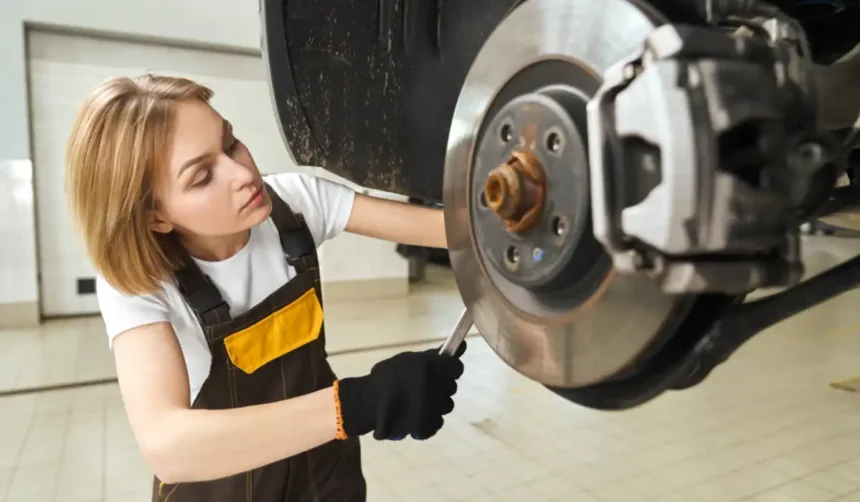Have you ever wondered what the most critical component of your car is? When it comes to safety, nothing is more vital than your brakes. But how often do you think about getting your brakes checked? Regular brake checks are essential to ensure your car remains safe on the road, preventing accidents and costly repairs. So, how can you ensure your braking system is always in top shape? Let’s explore the importance of regular brake checks and how they play a crucial role in car maintenance.
Why Are Regular Brake Checks Important?
Your car’s brakes are responsible for slowing down or stopping your vehicle, which makes them indispensable for safety. A properly functioning braking system reduces the risk of accidents, especially in emergency situations. Over time, however, brake pads wear out, and other components such as rotors and calipers can deteriorate, compromising your car’s ability to stop efficiently.
Key Reasons for Regular Brake Checks:
- Safety: Worn-out brakes increase stopping distances, making accidents more likely.
- Preventive maintenance: Identifying issues early prevents costly repairs.
- Peace of mind: Ensures that you and your passengers are safe at all times.
Signs Your Brakes Need Checking
It’s essential to recognize the warning signs that indicate your brakes need attention. Ignoring these signs can lead to brake failure, putting you at risk.
Common Warning Signs:
- Squeaking or squealing sounds: Often caused by worn brake pads.
- Vibrations when braking: A sign of warped rotors.
- Soft or spongy brake pedal: Could indicate air in the brake lines or a fluid leak.
- Car pulling to one side: Might suggest uneven wear on brake pads or a stuck caliper.
- Grinding noises: Indicates that the brake pads are completely worn, causing metal-to-metal contact.
If you experience any of these issues, schedule a brake inspection as soon as possible.
| Symptom | Possible Issue |
|---|---|
| Squeaking or squealing | Worn brake pads |
| Vibration | Warped rotors |
| Soft brake pedal | Air in brake lines or fluid leak |
| Car pulling | Uneven pad wear or stuck caliper |
| Grinding | Completely worn pads |
What Happens During a Brake Check?
A professional brake check involves inspecting multiple components of your braking system, ensuring everything functions correctly. The mechanic will assess the condition of your brake pads, rotors, calipers, and brake fluid.
Brake Check Components:
- Brake pads: These wear down over time and need to be replaced periodically.
- Rotors: If they’re warped or grooved, they can reduce braking efficiency.
- Calipers: Ensure the calipers are applying the right amount of pressure to the brake pads.
- Brake fluid: Old or contaminated brake fluid can lead to poor braking performance.
By inspecting these parts regularly, you can avoid larger and more expensive issues down the road.
How Often Should You Get Your Brakes Checked?
The frequency of brake checks depends on various factors, including your driving habits, the type of vehicle, and the environment in which you drive. As a general rule, most experts recommend getting your brakes checked every 12,000 miles or once a year. However, if you notice any of the warning signs mentioned earlier, don’t wait until your next scheduled inspection.
Key Factors Affecting Brake Wear:
- Driving conditions: City driving with frequent stops wears brakes faster than highway driving.
- Driving style: Aggressive braking shortens the lifespan of your brake pads.
- Vehicle weight: Heavier vehicles require more stopping power, wearing out brakes faster.
The Cost of Neglecting Brake Maintenance

Ignoring regular brake checks can lead to more than just poor performance. Failing to maintain your brakes can result in costly repairs, including the need to replace rotors, calipers, or even the entire braking system. Moreover, the risks to your safety and the safety of others on the road can be severe.
Potential Consequences:
- Brake failure: Neglecting brake maintenance can lead to complete brake failure, especially in emergency situations.
- Expensive repairs: Worn pads can damage rotors, increasing repair costs significantly.
- Reduced resale value: Poorly maintained brakes can lower your car’s resale value.
By staying on top of brake maintenance, you can avoid unnecessary costs and ensure your car remains safe and reliable.
FAQs About Brake Checks
Q1: How often should I replace my brake pads?
A: Brake pads should typically be replaced every 30,000 to 70,000 miles, depending on your driving habits and the type of brake pads you use.
Q2: What happens if I ignore squeaky brakes?
A: Squeaky brakes are often the first sign of worn brake pads. Ignoring them can lead to further damage, such as grinding, which indicates metal-to-metal contact.
Q3: Can I check my brakes at home?
A: While you can visually inspect your brake pads and rotors, a full brake check, including fluid levels and caliper condition, is best left to a professional.
Q4: How much does a brake check cost?
A: Most brake checks range from $50 to $100, depending on the shop and the extent of the inspection.
Q5: What causes a spongy brake pedal?
A: A spongy brake pedal is often caused by air in the brake lines or a brake fluid leak. This requires immediate attention, as it reduces braking efficiency.
Conclusion
Regular brake checks are not just a crucial aspect of car maintenance—they are a matter of life and death. Ensuring your braking system is in optimal condition protects you, your passengers, and everyone else on the road. Whether it’s listening for unusual sounds, feeling for changes in your brake pedal, or simply scheduling an annual brake inspection, taking these steps can prevent accidents and costly repairs.
Don’t wait for your brakes to fail. Prioritize brake maintenance as part of your regular car care routine and drive with peace of mind, knowing that your car is safe for the road ahead.








